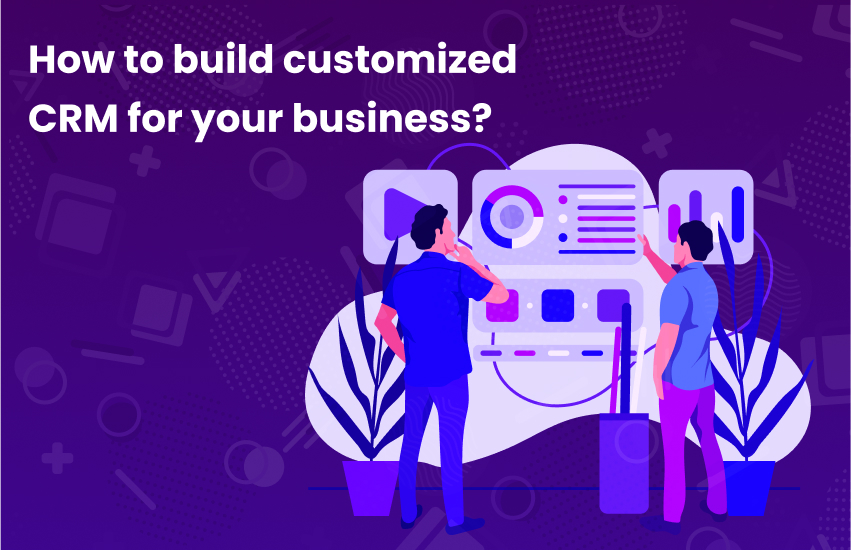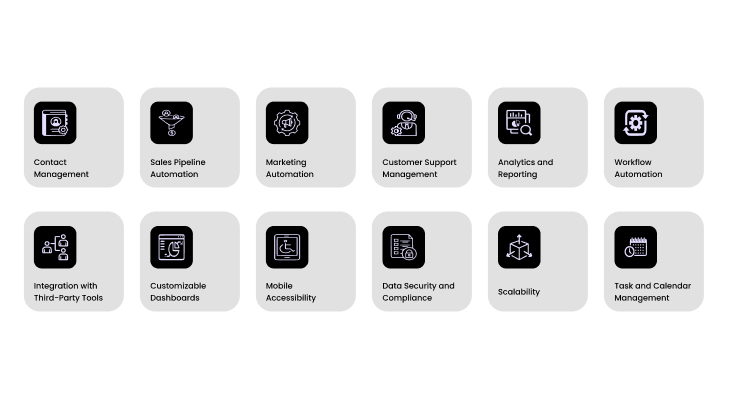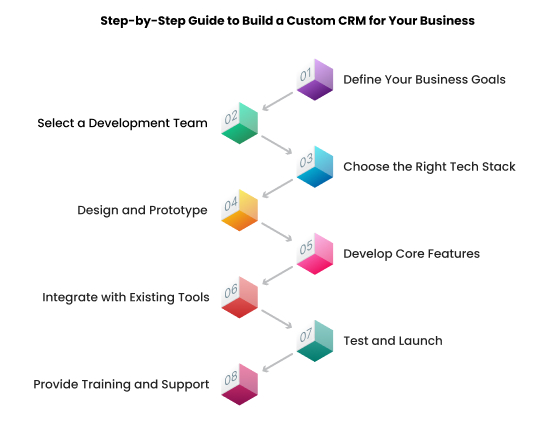How to build customized CRM for your business?

In today’s competitive landscape, businesses are prioritizing customer experience and data-driven decision-making like never before. According to Grand View Research, the global CRM market size was valued at $58.82 billion in 2022 and is projected to grow at a compound annual growth rate (CAGR) of 13.9% from 2023 to 2030. With businesses increasingly recognizing the need for efficient customer relationship management, it’s no surprise that over 91% of companies with 10+ employees use a CRM system to streamline their sales, marketing, and customer service operations.
However, choosing the right CRM solution can be overwhelming, especially with the variety of options available. While ready-made CRMs like Salesforce or HubSpot dominate the market, custom CRM solutions are gaining traction among businesses with unique needs and workflows. Custom CRMs offer the flexibility, scalability, and tailored functionality required for businesses to truly optimize their customer interactions and drive growth.
For businesses looking to tailor CRM systems specifically for their needs, a CRM for business can provide the best solution, helping you manage sales, customer data, and workflow seamlessly. Custom-built solutions also offer the best CRM management strategies by integrating features that perfectly align with your business goals. For CRM for startups, the flexibility of a custom system allows growing companies to scale quickly while ensuring streamlined operations and customer satisfaction.
This blog dives deep into the world of CRM systems, exploring how to build a customized CRM, the different types of CRMs, and the features and costs involved. Whether you’re a growing startup or an established business, this guide will help you understand why custom CRM development might be the perfect solution to achieve your organizational goals.
What Is CRM?
A CRM for business is software that stores and tracks all customer data in one place. It allows businesses to analyze customer information, improve decision-making, and streamline workflows. CRMs are valuable for companies of all sizes, particularly those with growing customer bases or complex sales processes.
Some common benefits of CRM systems include:
- Better customer management
- Enhanced sales and marketing efficiency
- Improved data-driven decision-making
- Increased customer satisfaction and retention

Essential Features of an Effective CRM System
An efficient CRM for business should provide comprehensive tools to enhance customer management, streamline operations, and drive business growth. Here are the key features every robust CRM should include:
- Contact Management: Centralized storage of customer data, including contact details, purchase history, and interaction records, ensuring easy access and organized communication.
- Sales Pipeline Automation: Tools to manage the sales funnel, automate repetitive tasks, score leads, and forecast revenue for better sales performance.
- Marketing Automation: Capabilities for automating email campaigns, tracking social media engagement, segmenting audiences, and delivering personalized communications at scale.
- Customer Support Management: Integrated tools for ticketing, live chat, and issue resolution to enhance customer satisfaction and loyalty.
- Analytics and Reporting: Real-time insights into customer interactions, sales performance, and marketing campaigns, enabling data-driven decision-making.
- Workflow Automation: Automation of routine tasks, such as follow-up emails, appointment scheduling, and lead assignment, to save time and improve productivity.
- Integration with Third-Party Tools: Seamless connectivity with existing systems like ERP, email platforms, project management software, and payment gateways for a unified experience.
- Customizable Dashboards: Personalized dashboards that allow team members to focus on their specific metrics and KPIs for better decision-making.
- Mobile Accessibility: A responsive mobile app that allows team members to access CRM features on the go, ensuring productivity from anywhere.
- Data Security and Compliance: Advanced security measures such as encryption, access controls, and compliance with regulations like GDPR or HIPAA to safeguard sensitive customer information.
- Scalability: The ability to scale features and user capacity as the business grows, ensuring the CRM continues to meet the organization’s evolving needs.
- Task and Calendar Management: Built-in tools to schedule appointments, set reminders, and track tasks to keep teams organized and efficient.
For businesses seeking a CRM for business that truly aligns with their needs, the best CRM management systems offer customizable options, enabling you to tailor the system to your operations. Whether you're a growing startup or an established enterprise, these tools help optimize customer interactions and provide a solid foundation for growth and scalability.
CRM Types: Why Opt for Custom Software?
When selecting a CRM solution, businesses often face the choice between off-the-shelf software and a custom-built system. Here's a comparison to help you decide:
Ready-Made CRMs
- Fast Deployment: These solutions are pre-built and can be implemented quickly.
- Subscription-Based Pricing: You pay recurring fees based on the number of users or features.
- Feature Overload: They often include unnecessary features that may not align with your needs.
- Limited Customization: Modifying workflows and functionality can be challenging.
- Rising Costs with Growth: As your team expands, subscription fees increase proportionally.
Custom CRM Development
- Tailored to Your Needs: Custom CRMs are designed to align perfectly with your specific business workflows and goals.
- No Recurring Fees: A one-time development cost eliminates ongoing user-based charges.
- Enhanced Data Security: Custom solutions allow you to implement the exact level of security and compliance required.
Scalability and Adaptability: Custom CRMs can grow with your business, allowing for easy expansion or feature additions as needed.
Advantages of Custom CRM Development
Custom CRM development offers significant benefits for businesses seeking tailored solutions to enhance customer relationships and operational efficiency. The main benefits are outlined below:
- Full Customization and Tailored Workflows
A custom CRM is designed to align perfectly with your unique business processes. Unlike off-the-shelf solutions, which require you to adapt to pre-set workflows, a custom CRM molds itself to your operations, ensuring seamless integration with existing systems and maximizing productivity. - Support for Unique Sales Models
Every business operates differently, especially in niche markets or industries with specialized needs. A custom CRM can accommodate complex or unconventional sales models, ensuring your business processes are fully supported, whether it’s multi-tiered lead management or complex deal structures. - Personalized Customer Experiences
Custom CRMs leverage your customer data to create tailored communication and services. From personalized marketing campaigns to customized product recommendations, a bespoke CRM helps deliver the experiences your customers expect, boosting loyalty and satisfaction. - Scalability with Unlimited Users
One of the limitations of ready-made CRMs is the rising subscription cost as your team grows. Custom CRMs eliminate user-based pricing, allowing your business to scale without incurring additional costs, no matter how large your team becomes. - Superior Data Management
Custom CRMs enable seamless organization and analysis of customer data. With tools specifically designed for your requirements, you can generate detailed insights, improve decision-making, and enhance overall business intelligence. - Enhanced Data Security and Compliance
Custom CRMs give you full control over how data is encrypted, stored, and accessed. By incorporating advanced security features and adhering to industry-specific regulations like GDPR or HIPAA, custom CRMs ensure that sensitive customer data remains protected from breaches or unauthorized access. - Long-Term Cost Efficiency
Although custom CRMs may require higher upfront investment, they save costs in the long run by eliminating recurring subscription fees, minimizing unnecessary features, and reducing the need for additional third-party integrations. - Integration with Existing Systems
A custom CRM is built to work seamlessly with your existing tools, such as ERP systems, project management software, or marketing automation platforms. This ensures smooth workflows and eliminates the need for workarounds or additional software purchases. - Better Team Collaboration and Productivity
By providing tools specifically designed for your team’s tasks, a custom CRM promotes better collaboration across departments, streamlines communication, and enhances productivity. - Competitive Advantage
With a CRM tailored to your specific goals and challenges, you gain a competitive edge. Custom features and processes help you stay ahead in the market by addressing your customers’ needs more effectively than competitors using generic tools.
11. Future-Proof Flexibility
As your business evolves, a custom CRM can evolve with it. Whether you need to add new features, integrate with emerging technologies, or scale to handle larger volumes of data, a custom solution offers the flexibility to grow with your business.

Step-by-Step Guide to Build a Custom CRM for Your Business
Developing a custom CRM tailored to your business needs requires a clear and methodical approach. Below is an in-depth guide on how to build your custom CRM, ensuring it aligns with your goals and delivers maximum value.
Define Your Business Goals
The first step in creating a custom CRM is to define your objectives. Start by identifying the pain points in your current customer management system and understanding the specific challenges your business faces. Pinpoint key features that are essential for your workflows, such as advanced analytics, lead tracking, or automation capabilities. A thorough analysis of your requirements will help you envision how the CRM can enhance operations, streamline customer interactions, and support long-term growth. By aligning the CRM’s design with your business model, you ensure it will address your unique needs effectively.
Select a Development Team
Choosing the right team to build your CRM is crucial for the success of the project. It’s essential to work with experienced developers or a software development company with expertise in CRM systems. Evaluate their portfolio, technical capabilities, and previous client feedback to ensure they can deliver what you need. Open and clear communication between your business and the development team is vital throughout the process. Setting clear expectations regarding the scope of work, deliverables, and timelines ensures the project stays on track and meets your requirements.
Choose the Right Tech Stack
The foundation of your CRM lies in the technology stack you choose. Selecting reliable programming languages such as Python, Java, or PHP, along with frameworks like Django, Laravel, or React, ensures the system’s scalability and efficiency. Opting for cloud platforms like AWS, Google Cloud, or Microsoft Azure provides secure data storage and easy accessibility. When choosing your tech stack, it is important to consider future growth and scalability to ensure the CRM can evolve alongside your business needs.
Design and Prototype
The design phase is where the CRM’s functionality and usability are planned. Start by creating wireframes to visualize the structure and flow of the CRM. Involve your sales, marketing, and customer service teams to ensure the design aligns with their needs. Prototyping allows you to test the functionality of your CRM early in the process and gather feedback from team members. This step helps identify areas for improvement and ensures the final product is intuitive and user-friendly.
Develop Core Features
The development phase focuses on building the essential features that form the backbone of your CRM. Key components include contact management to store and organize customer information, lead tracking and sales automation to streamline workflows, and reporting dashboards to provide real-time insights into customer interactions and sales performance. Customization should also be prioritized to allow flexibility, enabling you to add or modify features based on changing business requirements.
Integrate with Existing Tools
To ensure seamless operations, your CRM must integrate effectively with existing business tools. Compatibility with enterprise resource planning (ERP) systems, email platforms, and third-party apps such as marketing or accounting software is essential for smooth data exchange. By using APIs, you can enhance the CRM’s functionality and connect it with other tools, creating a centralized platform that simplifies workflows across departments.
Test and Launch
Testing is a critical step to ensure the CRM performs as intended. Rigorous functional testing and user acceptance testing (UAT) are essential to identify and address any issues. During UAT, involve team members who will be using the CRM to confirm it meets their needs and expectations. Fix any bugs or inconsistencies before launching the system. A gradual rollout, starting with a small group of users, helps gather feedback and refine the system before full-scale deployment, ensuring a smooth transition.
Provide Training and Support
Once the CRM is launched, comprehensive training and support are necessary to ensure its successful implementation. Conduct workshops or webinars to familiarize employees with the system’s features and functionality. Create detailed user manuals or video tutorials for easy reference, and establish a dedicated support team to address any issues or concerns. Ongoing support and regular updates will keep the CRM running efficiently, ensuring it continues to meet the evolving needs of your business.
Challenges of Custom CRM For Startups
Developing a custom CRM offers unparalleled flexibility and personalization, but the process is not without its challenges. Below is a detailed exploration of the potential obstacles businesses may face when building a tailored CRM solution.
Budget Constraints
One of the most significant hurdles in custom CRM development is the financial investment required upfront. Startups and small businesses often struggle to allocate the necessary budget for design, development, testing, and deployment. Unlike ready-made solutions, where costs are spread across subscription fees, custom CRMs require a substantial one-time investment. This includes not only development expenses but also costs for hiring skilled professionals, integrating advanced features, and ongoing maintenance. For companies operating with limited capital, these high initial costs can pose a serious challenge, requiring careful planning and prioritization to ensure a return on investment.
Time-Intensive Development
Custom CRM development is a time-consuming process that involves multiple phases, including planning, design, prototyping, development, testing, and deployment. Depending on the complexity of the required features and the scalability of the system, the process can take several months or even longer. This extended timeline can delay the expected return on investment (ROI), leaving businesses in a transitional phase where they must continue managing operations with outdated or less efficient systems. The longer the development process, the greater the risk of operational inefficiencies and missed opportunities.
Technical Expertise and Dependency
Building a custom CRM requires a high level of technical expertise, which is often beyond the capacity of in-house teams in small or mid-sized businesses. Without experienced developers or a reliable software development company, projects can face numerous setbacks, including poorly written code, feature misalignment with business goals, and compatibility issues with existing systems. Furthermore, businesses may become overly dependent on their development team or vendor, which can lead to challenges if the team disbands or the relationship ends. Ensuring access to skilled professionals and maintaining clear documentation is crucial to overcoming this challenge.
Post-Launch Support and Maintenance
The work doesn’t stop once the custom CRM is launched. Regular updates, bug fixes, and security enhancements are necessary to keep the system running efficiently and securely. These ongoing maintenance requirements can place additional demands on resources, particularly if the business lacks a dedicated IT team. Training staff to handle minor issues, updating features based on user feedback, and ensuring compatibility with evolving technologies are continuous responsibilities. If not managed effectively, inadequate post-launch support can lead to system inefficiencies, decreased user adoption, and data vulnerabilities, undermining the overall value of the CRM.
Conclusion
Investing in a custom CRM system offers businesses greater flexibility, tailored workflows, and long-term cost efficiency compared to off-the-shelf solutions. While the initial development requires a significant investment, the ability to create a CRM that aligns perfectly with your unique business processes, integrates seamlessly with existing tools, and scales with your growth makes it a valuable asset. Custom CRM development ensures that you pay only for the features you need while maintaining full control over security, data management, and user experience.
If you're looking to build a CRM that is designed specifically for your business needs, Akkenna offers expert custom CRM development services. With a team of skilled professionals and industry experience, Akkenna can help you create a powerful, scalable, and secure CRM solution tailored to your business goals.
FAQs About Custom CRM Development
A custom CRM for business provides tailored features, seamless integration, and full control over data security. Unlike off-the-shelf CRMs, it eliminates unnecessary features and subscription costs while adapting to unique business workflows.
The timeline depends on complexity, typically ranging from 3 to 12 months. Advanced features like AI-driven automation or third-party integrations may extend development time.
If your business requires unique workflows and advanced customization, a custom CRM is a superior choice. It avoids licensing fees and adapts as your business grows, making it more cost-effective in the long run.
Yes, a well-developed CRM for business can integrate with ERPs, accounting software, email marketing platforms, and other tools to streamline operations and improve efficiency.
Yes, a CRM for startups can be built with scalable features, ensuring cost-effective growth without recurring subscription fees. It allows startups to prioritize essential functions and expand as needed.
Akkenna specializes in custom CRM development, offering scalable, secure, and fully tailored solutions. Whether you need a CRM for startups or a full-fledged enterprise system, Akkenna ensures seamless integration, top-tier security, and optimized performance for your business needs.
A custom CRM for business is ideal for industries with unique workflows, such as real estate, healthcare, finance, e-commerce, and manufacturing. It enhances customer management, automates tasks, and integrates industry-specific tools.
The best CRM management systems include contact management, sales automation, reporting and analytics, marketing automation, and seamless integration with third-party tools like email and accounting software.
Yes, a CRM for business helps personalize interactions, track customer history, and automate follow-ups, leading to improved customer satisfaction and loyalty.

Subhashree Pandian
An ambitious content creator with a love for digital marketing, I enjoy developing content that reflects my personal touch and learning. Storytelling and sharing unique ideas are at the heart of what I do.